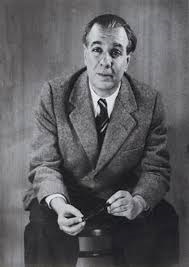Luis Borges Jorge was born on 24th august 1899 in a place known as Buenos Aires Argentina. He passed on14th June 1986 in Geneva Switzerland. Could possibly be describes as an Argentine essayist, short fiction writer and a poet whose literacy works became great in the 20th century in the world of literature. He grew up in the formerly Shabby Buenos Aires district which actually formed the basis of some of his works. Luis family which was actually notable in the history of Argentina factored in British ancestry and he actually knew English before Spanish. His father’s library was the source of the books that he read fist who was a man of extensive intellect who was an English school teacher. The books were such as the thousand and one nights, Don Quixote and the Adventures of Huckleberry which were all written in English. Under close monitoring and well laid example of his father, Luis from childhood understood that his destiny was a career in literature.
During the year 1914, at the time when World War I just started, Luis and his family moved to Geneva, where he was able to educate himself on French and German languages where he earned his Bachelor of Arts from College de Genève. He left with his family in 1919 and headed to Majorca where they spent a year and another year in Spanish mainland, this was the point where Luis united with Ultraist movement young writers, and organization that opposed what was thought of the decadence of created writers of the 188 period. In 1921 they went back to Buenos Aires where Luis rediscovered his home city and started to adapt into it. He published his first book which was a set of poems in 1923. Luis is also famous for starting the ultraist movement in South America. This part of his career factored in authorship of various essay volumes and poems together with beginning three journals of literature that concluded with a biography in 1930. He later overcame his coyness in writing pure fiction. In the beginning he chose to recap the lives of many or less eminent men as it peals out of his 1935 Universal History of Infamy.
To make a living Luis decided to pick on a major position at the library in Buenos Aires in 1938. The library was actually named after one of his ancestors and he spent 9 years in the library. In the year 1938 when his father died, Luis suffered a brutal wound in the head which was followed by poisoning of his blood and left him at the point of death and afraid of getting insane. After this incident he came out with charming stories within the eight years that followed and were later compiled in a set of translations known as The Aleph and Other Stories between 1933 and 1969. He also merged with Bioy Adolfo to come up with detective stories which went by the pseudonym H. Bustos Domecq and published in 1942. It is within this period that Luis also realized his whole dream world which was a paradox of the other one which own symbol systems and language.
When Dictator Juan Peron assumed power in the year 1946, Luis was relived off his duties in the library allegedly for articulating support of the enemies during World War II. With aid from friends, he earned a live being a lecturer, writing and editing. When Juan was in 1955 deposed, Luis rose to the national library director, and position filled with honor and also as an American literature and English professor at Buenos Aires University. However, he suffered a set back of total blindness, a disease which was considered hereditary since it had also attacked his father. This compelled him to stop writing huge texts and start dictating to assistants this works from this period own wards almost ruled out the differences between poetry and prose.
After the year 1961 a time when Samuel shared an international prize which was given for manuscripts that were not published, Luis poems were gradually highly praised as 20th century classics within the world of literature. Before that time, Luis was infamous even in his home city of Buenos Aires except to a few writers many of whom knew him as a craftsman of traditional techniques. Until his death, the bad dreams of his fictions had emerged to be related to Franz Kafka’s world and to be commended for focusing on traditional language into most permanent state. From his works, American Latin literature rose from the intellectual realm of normally sophisticated readers.
Luis also has the style of writing which is distinct as compared to other writers of his time. From his sets of work has acquired the Spanish language greatest writer title. A specific work that showcased his culture was Ficciones. The work was not just about his country of birth but rather true cultural knowledge emerged out from his style of writing. He has the capability of bringing together his readers by maximally making use of the style of writing commonly termed as Irony which is evident in close to whole his works.
Luis ensures that the peak of his specific pieces is hidden until when he concludes within the story. A major example of such is in “The garden of Forking Paths” which Luis places in it such structures, that the start of the story was absent so that when it was not till the end of the story that the story integrates together, which is the opposite of what many writers expected. The style of writing of Luis, is quite unique and in conformity with personal accounts. From Luis extensive elucidation in his phrases, and his skill to make use of irony, he has attained vastness in his writing works.




